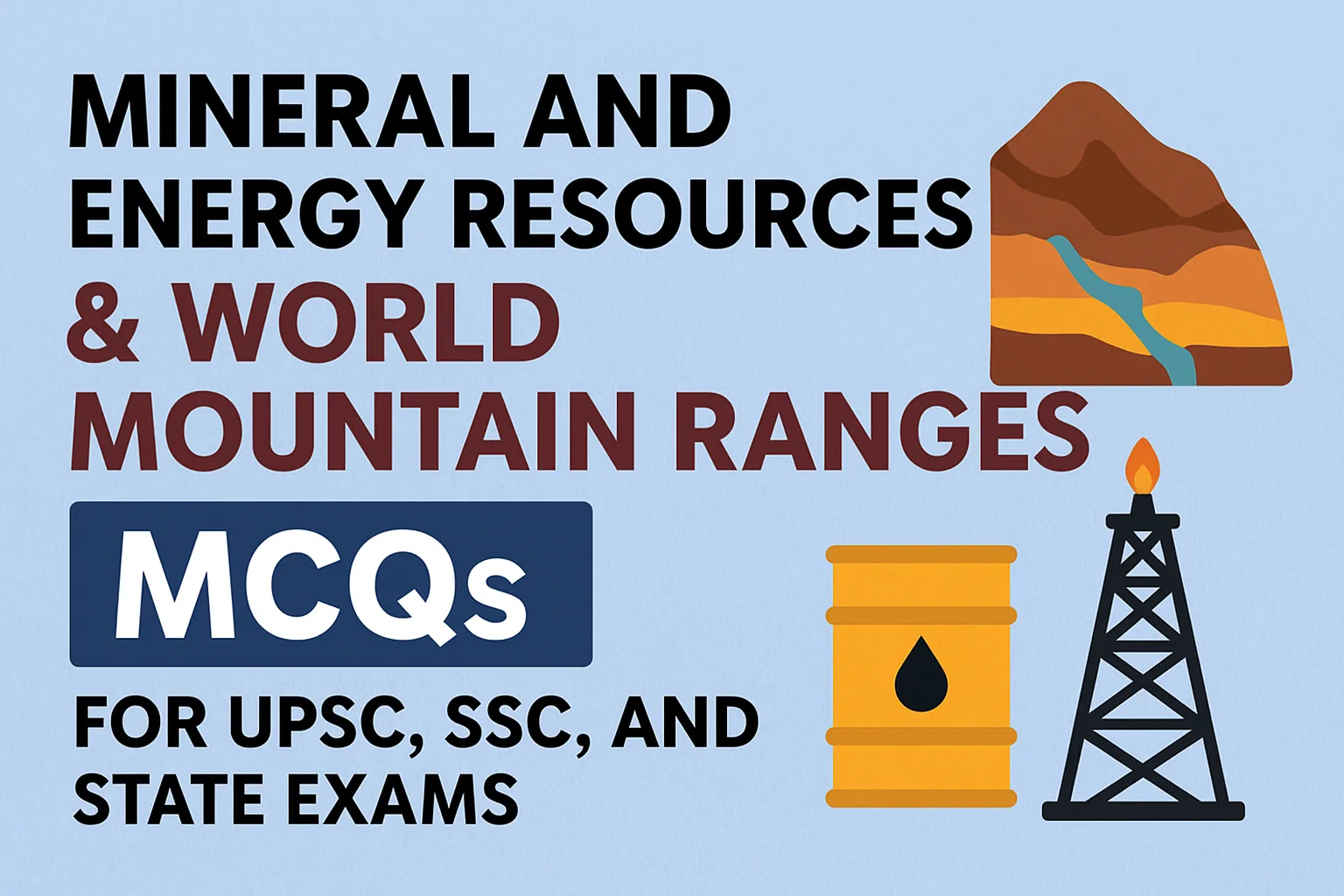Mineral and energy resources are very important for India’s growth and progress. They give us power for homes and industries and also provide raw materials for building, machines, and technology. These resources are the base of development. Knowing their types, uses, and where they are found is useful for studies and also for exams. The MCQs below will help you check your knowledge and prepare better for this topic.
The Rocky Mountains extend for about 4,800 km and are the largest mountain system in North America. Which peak is the highest in this range, standing at 4,401 m above sea level?
a) Mount Denali
b) Mount Elbert
c) Mount Rainier
d) Mount Logan
Answer: b) Mount Elbert
The Andes Mountains, considered the world’s longest mountain range, stretches for about 7,000 km across several countries. Which is the highest peak of the Andes, located in Argentina?
a) Mount Aconcagua
b) Mount Cotopaxi
c) Mount Chimborazo
d) Mount Ojos del Salado
Answer: a) Mount Aconcagua
The Alaska Range is about 950 km long and stretches from the Alaska-Canada border to the Alaska Peninsula. Which is its highest peak and also the tallest in North America?
a) Mount Fairweather
b) Mount Logan
c) Denali (Mount McKinley)
d) Mount Hunter
Answer: c) Denali (Mount McKinley)
The Alps stretch across eight Alpine countries in Europe. Which peak is the highest of the Western Alps, standing at 4,809 m?
a) Mont Blanc
b) Piz Bernina
c) Matterhorn
d) Jungfrau
Answer: a) Mont Blanc
Which mountain range lies between the Caspian Sea and the Black Sea, stretches for 1,200 km, and includes Mount Elbrus, the highest peak in Europe at 5,642 m?
a) Ural Mountains
b) Carpathians
c) Caucasus Mountains
d) Balkan Mountains
Answer: c) Caucasus Mountains
The Ural Mountains stretch for about 2,500 km from the Atlantic coast to northwestern Kazakhstan. What is their highest peak?
a) Mount Payer
b) Mount Narodnaya
c) Mount Elbrus
d) Mount Belukha
Answer: b) Mount Narodnaya
The Arakan Mountains, also called Rakhine Yoma, are an extension of the Himalayas located in Myanmar. Which is their highest peak?
a) Mount Popa
b) Nat Ma Taung (Mount Victoria)
c) Hkakabo Razi
d) Mount Saramati
Answer: b) Nat Ma Taung (Mount Victoria)
The Great Dividing Range in eastern Australia extends for about 3,500 km. What is its highest peak?
a) Mount Townsend
b) Mount Kosciuszko
c) Mount Bogong
d) Mount Ossa
Answer: b) Mount Kosciuszko
The Hindukush Mountains stretch across Afghanistan and northern Pakistan for about 800 km. Which peak is the highest in this range?
a) Tirich Mir
b) Koyo Zom
c) Noshaq
d) Rakaposhi
Answer: b) Koyo Zom
Which of the following is among the longest mountain chains in Asia, extending over 3,000 km and lying parallel to the Himalayas in the south?
a) Altai Mountains
b) Kunlun Mountains
c) Pamir Mountains
d) Tian Shan Mountains
Answer: b) Kunlun Mountains
The Transantarctic Mountains divide Antarctica into East and West. Which peak, at 4,528 m, is the highest in this range?
a) Mount Kirkpatrick
b) Mount Vinson
c) Mount Erebus
d) Mount Tyree
Answer: a) Mount Kirkpatrick
Which mountain range, stretching through Morocco, Algeria, and Tunisia, separates the Mediterranean and Atlantic coastlines from the Sahara Desert?
a) Rif Mountains
b) Atlas Mountains
c) Ahaggar Mountains
d) Drakensberg Mountains
Answer: b) Atlas Mountains
The Himalayas were formed due to the collision of which two tectonic plates?
a) African Plate and Eurasian Plate
b) Pacific Plate and Indian Plate
c) Indian Plate and Eurasian Plate
d) Arabian Plate and Eurasian Plate
Answer: c) Indian Plate and Eurasian Plate
Which is the highest peak of the Himalayas and the world, first summited by Edmund Hillary and Tenzing Norgay in 1953?
a) Kanchenjunga
b) Mount Everest (Sagarmatha)
c) Dhaulagiri
d) Makalu
Answer: b) Mount Everest (Sagarmatha)
The Himalayas are divided into three parallel ranges: the Greater Himalayas, the Lesser Himalayas, and which other?
a) Arakan Yoma
b) Shivalik Hills
c) Karakoram Range
d) Vindhyas
Answer: b) Shivalik Hills
Which range, also known as the Inner Himalayas or Himadri, contains most of the world’s highest peaks with an average height of about 6,000 m?
a) Lesser Himalayas
b) Shivalik Hills
c) Greater Himalayas
d) Purvanchal Hills
Answer: c) Greater Himalayas
The Pir Panjal, Dhauladhar, and Mahabharat ranges are part of which division of the Himalayas?
a) Greater Himalayas
b) Lesser Himalayas
c) Shivaliks
d) Trans-Himalayas
Answer: b) Lesser Himalayas
Which valleys—Kangra, Kullu, and Kashmir—are associated with the Middle or Lesser Himalayas?
a) Punjab Valleys
b) Shivalik Valleys
c) Doon Valleys
d) Lesser Himalayan Valleys
Answer: d) Lesser Himalayan Valleys
Which Himalayan range is the youngest, outermost, and rarely exceeds 1,300 m in height?
a) Greater Himalayas
b) Shivalik Hills
c) Karakoram Range
d) Zanskar Range
Answer: b) Shivalik Hills
The Punjab Himalayas, also known as Kashmir Himalayas, lie between which two rivers?
a) Ganga and Yamuna
b) Indus and Satluj
c) Tista and Dihang
d) Kali and Satluj
Answer: b) Indus and Satluj
Which part of the Himalayas, lying between Satluj and Kali rivers, is also called Kumaon Himalayas or Garhwal Himalayas?
a) Punjab Himalayas
b) Central Himalayas
c) Nepal Himalayas
d) Kumaon Himalayas
Answer: d) Kumaon Himalayas
The Central or Nepal Himalayas lie between which two rivers?
a) Satluj and Yamuna
b) Indus and Ganga
c) Tista and Kali
d) Ganga and Brahmaputra
Answer: c) Tista and Kali
Which Himalayan region, lying between the Tista River and the Dihang River (Brahmaputra), is also known as the Assam Himalayas?
a) Eastern Himalayas
b) Lesser Himalayas
c) Shivalik Range
d) Trans-Himalayas
Answer: a) Eastern Himalayas
Which trans-Himalayan range, parallel to the Zaskar, contains Nanga Parbat (8,126 m)?
a) Karakoram Range
b) Ladakh Range
c) Zanskar Range
d) Pir Panjal Range
Answer: c) Zanskar Range
Which mountain range, part of the Trans-Himalayas, contains K2 (Godwin Austen) at 8,611 m, the second-highest peak in the world?
a) Karakoram Range
b) Ladakh Range
c) Pamir Mountains
d) Hindu Kush Range
Answer: a) Karakoram Range

